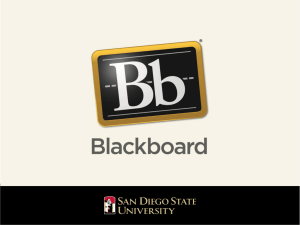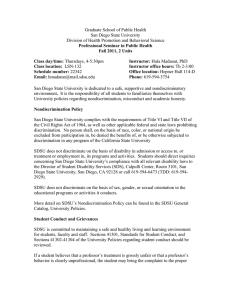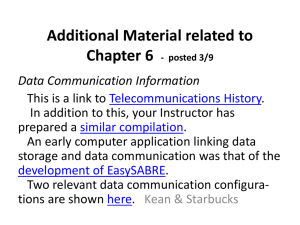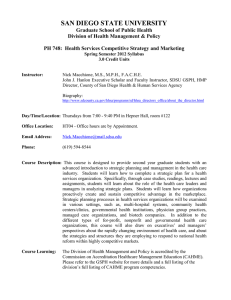PH 605: Health Services Administration
advertisement
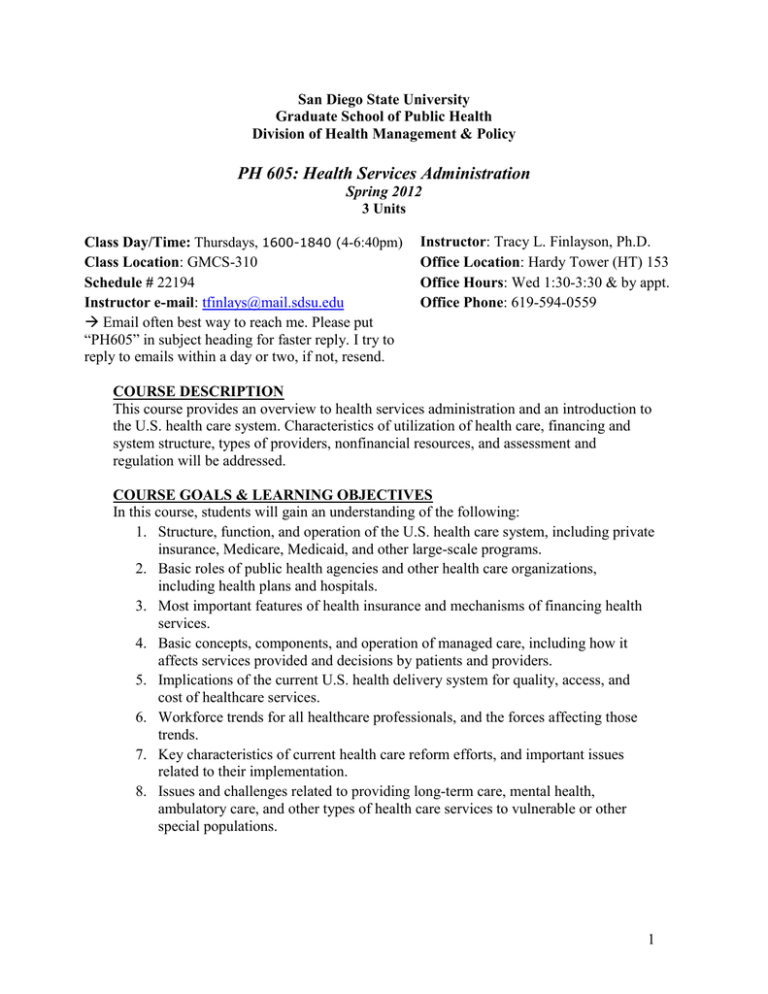
San Diego State University Graduate School of Public Health Division of Health Management & Policy PH 605: Health Services Administration Spring 2012 3 Units Class Day/Time: Thursdays, 1600-1840 (4-6:40pm) Class Location: GMCS-310 Schedule # 22194 Instructor e-mail: tfinlays@mail.sdsu.edu Email often best way to reach me. Please put “PH605” in subject heading for faster reply. I try to reply to emails within a day or two, if not, resend. Instructor: Tracy L. Finlayson, Ph.D. Office Location: Hardy Tower (HT) 153 Office Hours: Wed 1:30-3:30 & by appt. Office Phone: 619-594-0559 COURSE DESCRIPTION This course provides an overview to health services administration and an introduction to the U.S. health care system. Characteristics of utilization of health care, financing and system structure, types of providers, nonfinancial resources, and assessment and regulation will be addressed. COURSE GOALS & LEARNING OBJECTIVES In this course, students will gain an understanding of the following: 1. Structure, function, and operation of the U.S. health care system, including private insurance, Medicare, Medicaid, and other large-scale programs. 2. Basic roles of public health agencies and other health care organizations, including health plans and hospitals. 3. Most important features of health insurance and mechanisms of financing health services. 4. Basic concepts, components, and operation of managed care, including how it affects services provided and decisions by patients and providers. 5. Implications of the current U.S. health delivery system for quality, access, and cost of healthcare services. 6. Workforce trends for all healthcare professionals, and the forces affecting those trends. 7. Key characteristics of current health care reform efforts, and important issues related to their implementation. 8. Issues and challenges related to providing long-term care, mental health, ambulatory care, and other types of health care services to vulnerable or other special populations. 1 REQUIRED COURSE MATERIALS Textbook (T): S.J. Williams & P.R. Torrens, eds. Introduction to health services, 7th ed. Albany, NY: Delmar. 2008. Available at the SDSU Bookstore. Reader (R): There is a course reader that will be used in the second half of the term that contains two required readings and is available at the SDSU bookstore for about $12. Past year PH 605 or 641 readers will also work if you can find one. It should include these 2 chapters: o Harris, D. CH 4: The legal structure and governance of healthcare organizations. Contemporary issues in healthcare law and ethics, 3rd ed. Health Administration Press. 2007. o Wing & Gilbert, eds. CH 1: The law and the legal system. The law and the public's health, 7th ed. Health Administration Press. 2007. Blackboard (B): Be sure to check Blackboard regularly (at least weekly) for any announcements and additional materials in Course Documents. Materials outside of the textbook and reader (handouts, class discussion materials, journal articles, etc) will be posted there at least a week in advance. Note that some materials are on the web. Each week’s class lecture notes will also be posted there, usually by the night before class, if not sooner. Be sure to also ensure your e-mail address is current and check your e-mail regularly for any important class announcements sent via Blackboard. Full references for req uired Blackboard readings: o Healthy People 2020 Leading Health Indicators brochure http://www.healthypeople.gov/2020/TopicsObjectives2020/pdfs/HP2020_bro chure_with_LHI_508.pdf o Kaiser Family Foundation. 2011a. Summary of new health reform law. http://www.kff.org/healthreform/upload/8061.pdf o Kaiser Family Foundation. 2011b. Summary of coverage provisions. http://www.kff.org/healthreform/upload/8023-R.pdf o Donabedian, A. 1990. The seven pillars of quality. Arch Pathol Lab Med 114:1115-8 o California Hospital Quality Rating webpage http://www.calhospitalcompare.org Other recommended resources: AcademyHealth’s Glossary of commonly used terms in healthcare (2004): http://wwwold.academyhealth.org/publications/glossary.htm Current healthcare reform: http://healthreform.kff.org/ Student essay contest: http://www.kaiseredu.org/essay-contest.aspx 2 COURSE REQUIREMENTS The final course grade will be determined as follows: Attendance & participation 15% Assignment 15% Midterm Exam 35% Final Exam 35% 100% Attendance & participation This is a larger size primarily lecture-based course, but you are expected to attend all classes. Attendance will be taken during most class sessions. You are expected to complete the week’s assigned reading in advance of class, and participate in the in-class discussions and activities. It is your responsibility to get class notes and learn the material if you must miss class. Your final course grade will be lowered a full grade if you miss more than four class sessions. Assignment You will receive separate instructions in advance for completing the short written hospital assignment. This will be due in class on 3/22/12. Exams The midterm and final exams are each 2 hour, in-class, closed book/closed notes exams. Exam format will include a combination of short answer, multiple choice, true/false, matching and fill-in type questions. The exams are not cumulative. No exams will be given early under any circumstances, and make-ups given only under valid extenuating circumstances with provided documentation. Therefore, please note the exam dates: MIDTERM EXAM – March 8, 2012 from 4-6pm FINAL EXAM – May 10, 2012 from 4-6pm COURSE GRADING SCALE The following scale gives the approximate percentage cutoffs for grades in this course, there is no curve. Note this is a core course in GSPH, and students must earn a grade of B- or above to pass the class. GSPH issues written midterm warnings to any student in danger of failing the class. If you are in danger of failing, contact the instructor immediately to discuss how you might work to improve your grade. Also note that a passing midterm grade does not guarantee a passing grade in the class. A = 95% A- = 90% B+ = 87% B = 85% B- = 80% C+ = 77% C = 75% C- = 70% D+ = 67% D = 65% D- = 60% F = <59% Course Syllabus Subject to Change Every effort will be made to follow the syllabus content and schedule; however, if circumstances dictate there may be modifications necessary during the semester. If such is the case the instructor will make every effort to notify the class in a timely manner (likely through Blackboard and email announcements). 3 COURSE POLICIES Missing class: If you miss a class, it is your responsibility to contact the instructor to discuss alternatives to any quiz or exercise you miss, and to obtain lecture notes, handouts, other materials or instructions from the course Blackboard site or a classmate. Religious holidays: The University Policy File includes the following statement on absence for Religious Observances: By the end of the second week of classes, students should notify the instructors of affected courses of planned absences for religious observances. Extenuating circumstances: If severe difficulties (e.g., illness, injury, death of a family member) prevent you from completing an assignment on time, please contact the instructor to discuss alternative arrangements as soon as possible. Academic misconduct: Misconduct by a student shall include, but not be limited to: disrupting classes; giving or receiving unauthorized aid on examinations, reports or other assignments; knowingly misrepresenting the source of any academic work; falsifying research results; plagiarizing another’s work; violating regulations or ethical codes for the treatment of human subjects; or otherwise acting dishonestly. If an instance of academic misconduct is suspected, the student will be informed of the infraction and the penalty to be imposed. If appropriate, the matter will be referred to the Department Chair and Dean of the College for mediation. Potential sanctions include a warning, an admonition, censure, reduction of grade (including a grade of F for the course), disciplinary probation, suspension, or expulsion. Computers: Every student must have access to the internet and a computer in order to obtain communications from the professor, download reading material and conduct document searches of on-line publications. Safety: Students are encouraged to consult with SDSU public safety regarding parking and other safety issues. San Diego State University is dedicated to a safe, supportive and nondiscriminatory environment. It is the responsibility of all students to familiarize themselves with University policies regarding nondiscrimination, misconduct and academic honesty. Statement on Nondiscrimination Policy San Diego State University complies with the requirements of Title VI and Title VII of the Civil Rights Act of 1964, as well as other applicable federal and state laws prohibiting discrimination. No person shall, on the basis of race, color, or national origin be excluded from participation in, be denied the benefits of, or be otherwise subjected to discrimination in any program of the California State University SDSU does not discriminate on the basis of disability in admission or access to, or treatment or employment in, its programs and activities. Students should direct inquiries concerning San Diego State University’s compliance with all relevant disability laws to the Director of Student Disability Services (SDS), Calpulli Center, Room 3101, San Diego State University, San Diego, CA 92128 or call 619-594-6473 (TDD: 619-594-2929). SDSU does not discriminate on the basis of sex, gender, or sexual orientation in the educational programs or activities it conducts. More detail on SDSU’s Nondiscrimination Policy can be found in the SDSU General Catalog, University Policies. 4 Student Conduct and Grievances SDSU is committed to maintaining a safe and healthy living and learning environment for students, faculty and staff. Sections 41301, Standards for Student Conduct, and Sections 4130241304 of the University Policies regarding student conduct should be reviewed. If a student believes that a professor’s treatment is grossly unfair or that a professor’s behavior is clearly unprofessional, the student may bring the complaint to the proper university authorities and official reviewing bodies. See University policies on Student Grievances. Statement on Plagiarism and Academic Dishonesty Academic dishonesty includes cheating, plagiarism or other forms of academic dishonesty that are intended to gain unfair academic advantage. See section 41301 of the University policies. Plagiarism is an important element of this policy. Plagiarism is defined as ‘formal work publicly misrepresented as original; it is any activity wherein one person knowingly, directly and for lucre, status, recognition, or any public gain resorts to the published or unpublished work of another in order to represent it as one’s own’. Any work, in whole or in part, taken from the Internet or other computer-based source without referencing the source is considered plagiarism. 5 PH 605 COURSE SCHEDULE Topics Week 1 Date 1/19 2 1/26 3 2/2 4 2/9 5 2/16 6 2/23 7 3/1 Course overview Introduction to the U.S. health care system Public Health: Joint Public-Private responsibility Technology Population and disease patterns and trends Determinants of health Access to care Financing & structuring health systems Healthcare reform Medicare Financing & structuring health systems Medicaid, SCHIP Provider reimbursement Financing & structuring health systems Health insurance Managed care 8 3/8 MIDTERM EXAM 9 10 3/15 3/22 Ambulatory health care services Hospitals and health systems Activity: Developing a hospital 11 12 13 14 3/29 4/5 4/12 4/19 4/26 SPRING RECESS Long term care Mental and behavioral health services Health care professionals Quality of healthcare 15 5/3 Health Policy Law and the legal system Ethical issues in public health & health services Course wrap-up 16 5/10 FINAL EXAM * Note: B: Blackboard, R: Reader Notes & Assignments* CH 1 CH 6, p 143-154, 157-8 CH 2 CH 3 B: HP 2020 CH 4, p 76-89 B: KFF 2011a&b CH 4, p89-95, 105-107 B: Show me the money worksheet CH 5, p 109-122 CH 5, p 122-139 & CH 6, p154-156. Optional: CH 16, p 346-352 recommended-review B: MC worksheet 2 hours only (4-6 pm) Note: KFF essay due 3/12 CH 7, p 161-176 only. CH 8 R: Harris CH & problem HOSPITAL ASSN. DUE NO CLASS CH 9 CH 10 CH 12 CH 14 B: Quality worksheet B: Donabedian CH 13 & 15 R:Wing & Gilbert Optional: CH 16, p 353-6, 358-63 2 hours (4-6 pm) You are expected to complete the reading assignments before class. Our class sessions will primarily be lecture, with some interactive class discussions. You should also feel free to ask questions in class. Class sessions will emphasize key points in the reading, and are not meant to replace doing the readings. 6
